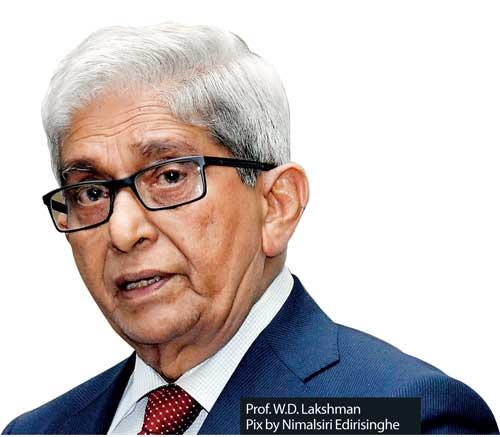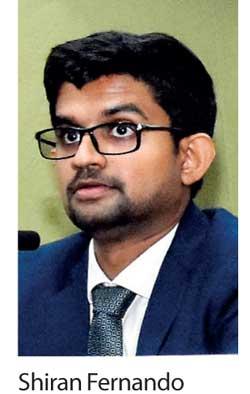11 Feb 2020 - {{hitsCtrl.values.hits}}
By Nishel Fernando
Amid concerns over fiscal slippages and uptick in fiscal deficit, the Central Bank (CB) is mulling entering into a fresh programme with the International Monetary Fund (IMF), under the policy framework of the new government.
“I had long chats with the last IMF team arrived in Sri Lanka and we will have talks with them later on and develop a programme within the kind of policy framework we agree, as long as that is permitted. The IMF team told me that it is permitted and the country concerned has to develop the programme.

On that basis, I think there would be a discussion for a new programme; whether it will finalise or not is yet to be decided on the basis of development,” CB Governor Prof. W.D. Lakshman revealed.
He was speaking yesterday at the Annual Economic Outlook Forum 2020, organised by the Ceylon Chamber of Commerce, in Colombo.
Sri Lanka negotiated an extended arrangement with the IMF in 2016, as the country faced twin deficits amid piling up of external debt repayments. The IMF has so far disbursed US $ 1.3 billion out of the approved US $ 1.5 billion Extend Fund Facility (EFF) in six tranches. The last EFF programme review is to be conducted before June 2, this year.
Sri Lanka has missed the primary surplus target under the programme by a sizable margin in 2019, with a recorded deficit of 0.3, due to the weak revenue performance and expenditure overruns, according to the IMF.
The IMF warned following its recent staff visit to the country that the primary deficit could widen further to 1.9 percent of GDP and the overall fiscal deficit to 7.9 percent in 2020, under the current policies.
In addition, the current account deficit is also projected to increase to 2.9 percent of GDP this year, from the estimated 2.5 percent, last year.
“Given the risks to debt sustainability and large refinancing needs over the medium term, renewed efforts to advance fiscal consolidation will be essential for macroeconomic stability,” the IMF stated.
Further, Sri Lanka’s net international reserves also fell short of the end-December target under the EFF-supported programme in 2019, by about US $ 100 million, amid market pressures after the presidential election and announced tax cuts.
However, Prof. Lakshman declined to comment whether Sri Lanka is abandoning the current IMF programme to enter into a new programme.
Sri Lanka has been the recipient of 16 IMF loans and the country hasn’t completed six of these programmes.
“As expected in this juncture with a significant policy shift away from the outgoing EFF programme, the press release cautiously refers to positive elements in the current policy framework while pointing out to relevant risks,” he said commenting on the recent press release issued by the IMF upon completing their staff visit.
The new government has delayed Sri Lanka’s financing plan for debt repayment until the end of parliamentary elections anticipated in April while postponing the US $ 500 million Samurai Bond issuance planned by the previous regime.
However, the largest foreign debt repayment for the year is scheduled in October.
Speaking at the occasion, Fitch Rating Sri Lanka Country Head Maninda Wickramasinghe expressed concerns over the potential fiscal slippages while emphasising on the need to meet these revenue gaps.
“Fitch’s view now is, while external risks exist, it has moderated but the fiscal slippages are likely to be higher, which is worrying,” he said.
Prof. Lakshman commended the neutral position taken by the IMF on the new government’s policy framework while stressing that the IMF is not treated as an enemy in Sri Lanka.
“The cautiously neutral position taken by the IMF team about the new policy regime in the country wouldn’t probably cause undue disturbances in the country’s financial markets,” he added.
Although the IMF forecasted 3.7 percent economic growth, upgrading the earlier 3.5 percent growth for the year, Prof. Lakshman was confident that Sri Lanka’s economic growth would reach 4 percent this year.
However, he acknowledged that Sri Lanka has serious problems impacting the economy from the fiscal and external sectors.
“This is a country run on deficit budgets. These are problems that we haven’t addressed with clear-cut policies. It might take years to achieve results but we need to start addressing them at least now,” he said.
The IMF has called the government to move ahead with growth-enhancing structural reforms to fully harness Sri Lanka’s economic potential and foster greater social inclusion.
“There are difficult decisions that ought to be made by political authorities,” Prof. Lakshman said.
He opined that as the IMF distanced itself from the Washington Consensus framework, the IMF might support the present government to move away from the framework.
“In that case, attempt from the present government to move away from that framework might even receive active IMF support, that’s perhaps wishful thinking,” he added.
Commenting on Sri Lanka’s current account deficit, Prof. Lakshman was optimistic that the current account deficit would continue to narrow during the year, backed up by a continuous contraction in imports.
He expects that foreign capital flows, portfolio and direct investment would during the year improve business confidence.
The Ceylon Chamber of Commerce (CCC) yesterday warned that the anticipated acceleration in economic growth could come at the cost of stability while calling for implementation of key structural reforms to sustain the growth momentum.

“As far as Sri Lanka is concerned, it’s a clear balance between growth and stability. Will we go back to resolving monetary and fiscal stimulus, which is not backed up by reforms and adjustments in interest rates and currency?” CCC Chief Economist Shiran Fernando said sharing the highlights of the CCC’s 2020 Annual Economic Outlook publication.
The new government has granted sweeping tax cuts and has announced plans to recruit around 150,000 to the state sector within the year.
Fernando noted that Sri Lanka tends to run into twin deficits leading to adjustments in interest rates and currency during election cycles as seen in 2010 and 2015.
Hence, he emphasised the need to balance growth with stability to avoid such issues in the future.
Despite a 25 percent YoY contraction in trade deficit during the first 11 months of 2019, Fernando warned that imports could expand during this year backed by the anticipated uptick in public expenditure, which could put pressure on the rupee.
“Imports are likely to very much pick up due to the consumption boost that we’ve seen through measures provided by the government and that will impact trade deficit. If the trade deficit expands, there will be more pressure on rupee,” he said.
Further, he noted that growth in exports was halted while contraction in imports was also slowed down during the last couple of months of 2019.
However, the CCC projects better performance across key sectors in 2020 in the domestic economy.
The CCC expects that lower interest rates and fiscal stimulus would boost the consumer durable sector while a pick up in consumption is also expected in non-essential categories of the FMCG sector.
However, Fernando said that the growth of the apparel sector would largely depend on market access and negating trade risks while the outcome on wage discussion would be crucial for outlook of the tea sector.
Moving forward, the CCC urged the government to focus on key structural reforms as well as low hanging fruits.
“Some are structural reforms and some are more low hanging fruits. For an example, Digital ID could potentially tie up loose ends such as welfare spending, tax collection and healthcare. Similarly, East Container terminal could boost logistic sector,” Fernando said.
16 Nov 2024 2 hours ago
16 Nov 2024 2 hours ago
16 Nov 2024 3 hours ago
16 Nov 2024 3 hours ago
16 Nov 2024 4 hours ago